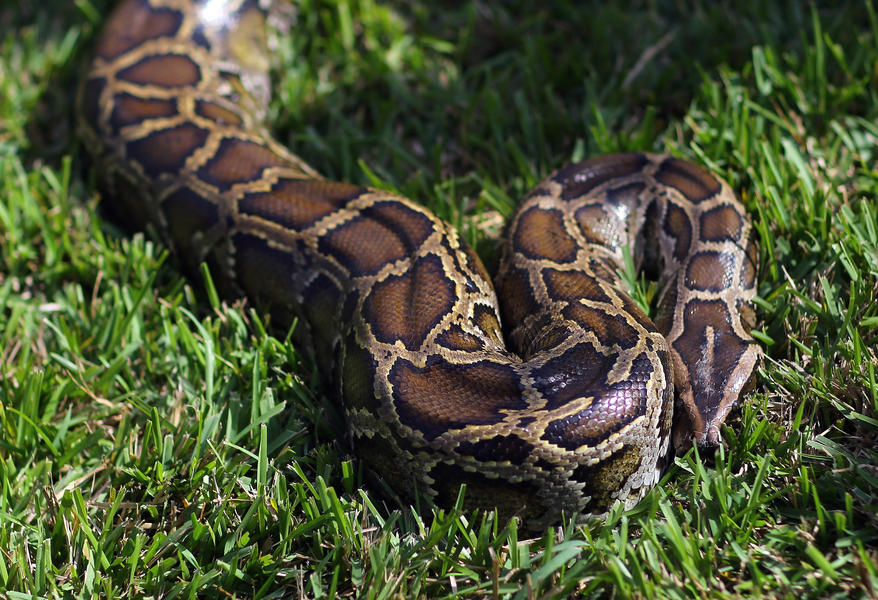Giant python has species' first ever 'virgin birth'


A free daily email with the biggest news stories of the day – and the best features from TheWeek.com
You are now subscribed
Your newsletter sign-up was successful
Ready your myrrh, folks: A reticulated python named Thelma has given birth to six little miracles of science.
Staff at the Louisville Zoo in Kentucky suspected something was amiss, reports National Geographic, when the 200-pound, 20-foot-long snake produced six female offspring in June 2012, despite not having been in contact with a male counterpart. Now DNA evidence published in the Biological Journal of the Linnean Society confirms that there wasn't another parent in the mix: it was all Thelma.
Virgin births — known scientifically as parthenogenesis — have occurred in other reptiles, though this is the first instance ever recorded in a reticulated python, the world's longest snake. Explains National Geographic:
The Week
Escape your echo chamber. Get the facts behind the news, plus analysis from multiple perspectives.

Sign up for The Week's Free Newsletters
From our morning news briefing to a weekly Good News Newsletter, get the best of The Week delivered directly to your inbox.
From our morning news briefing to a weekly Good News Newsletter, get the best of The Week delivered directly to your inbox.
This phenomenon occurs when polar bodies, or cells produced with an animal's egg that normally die or disappear, behave like sperm and fuse with the egg. [National Geographic]
Scientists can't tell what catalyzes parthenogenesis, but they think loneliness might have something to do with it. "I guess sometimes truth is stranger than fiction," said Bill McMahan, the zoo's curator of cold-blooded animals.
A free daily email with the biggest news stories of the day – and the best features from TheWeek.com
Nico Lauricella was editor-in-chief at TheWeek.com. He was formerly the site's deputy editor and an editor at The Huffington Post.
-
 The EU’s war on fast fashion
The EU’s war on fast fashionIn the Spotlight Bloc launches investigation into Shein over sale of weapons and ‘childlike’ sex dolls, alongside efforts to tax e-commerce giants and combat textile waste
-
 How to Get to Heaven from Belfast: a ‘highly entertaining ride’
How to Get to Heaven from Belfast: a ‘highly entertaining ride’The Week Recommends Mystery-comedy from the creator of Derry Girls should be ‘your new binge-watch’
-
 The 8 best TV shows of the 1960s
The 8 best TV shows of the 1960sThe standout shows of this decade take viewers from outer space to the Wild West
-
 Nobody seems surprised Wagner's Prigozhin died under suspicious circumstances
Nobody seems surprised Wagner's Prigozhin died under suspicious circumstancesSpeed Read
-
 Western mountain climbers allegedly left Pakistani porter to die on K2
Western mountain climbers allegedly left Pakistani porter to die on K2Speed Read
-
 'Circular saw blades' divide controversial Rio Grande buoys installed by Texas governor
'Circular saw blades' divide controversial Rio Grande buoys installed by Texas governorSpeed Read
-
 Los Angeles city workers stage 1-day walkout over labor conditions
Los Angeles city workers stage 1-day walkout over labor conditionsSpeed Read
-
 Mega Millions jackpot climbs to an estimated $1.55 billion
Mega Millions jackpot climbs to an estimated $1.55 billionSpeed Read
-
 Bangladesh dealing with worst dengue fever outbreak on record
Bangladesh dealing with worst dengue fever outbreak on recordSpeed Read
-
 Glacial outburst flooding in Juneau destroys homes
Glacial outburst flooding in Juneau destroys homesSpeed Read
-
 Scotland seeking 'monster hunters' to search for fabled Loch Ness creature
Scotland seeking 'monster hunters' to search for fabled Loch Ness creatureSpeed Read
